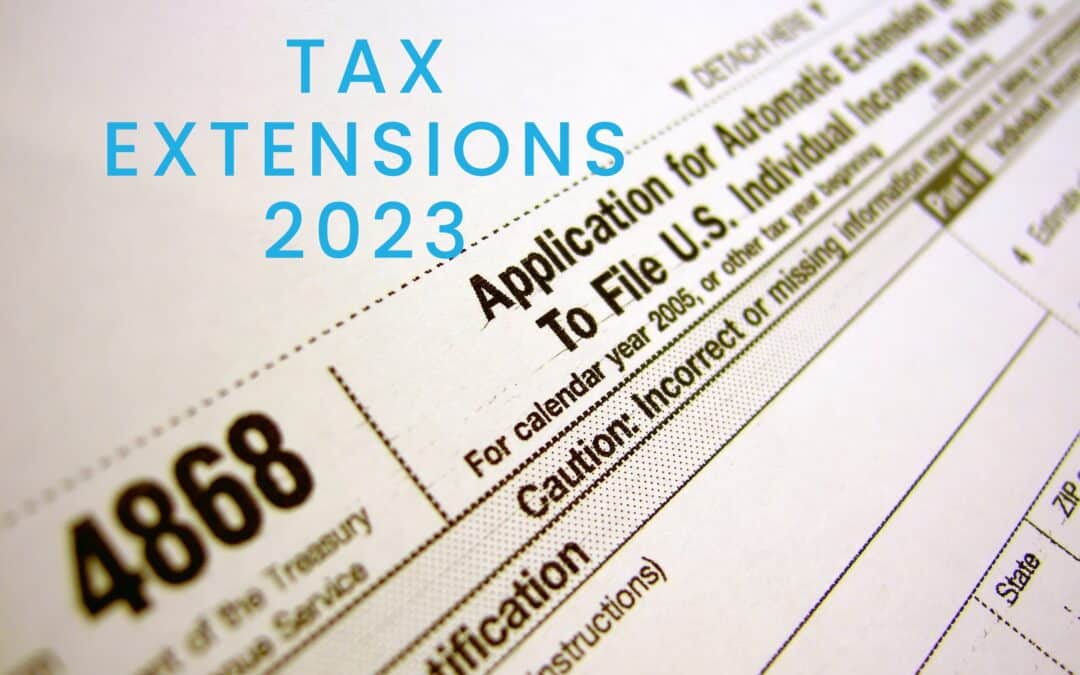Tax Extensions in 2023
For most individuals and small businesses, federal income tax returns for 2022 are due this Tuesday—April 18, 2023 (multi-member LLCs, S corps, and partnerships were due March 15). If you’re feeling stressed about meeting the deadline, we’ve got some tips for you, including information on IRS-granted extensions. (As a reminder our tax experts are always here to take the stress and worry of tax filing off your plate and help you keep more of what you earn.)
For 2023, The IRS has granted tax extensions in seven states
Severe weather across the country has led the IRS to grant automatic tax extensions in parts of Alabama, Arkansas, California, Georgia, Mississippi, New York, and Tennessee. You don’t have to reside in the affected counties to receive the tax extension—if records or materials you need to file your taxes were housed in a federally declared disaster zone, you may qualify. We’ve got all the details below, plus information on filing for an extension even if you aren’t affected by the severe weather in those seven states.
Alabama Tax Extensions 2023
At the beginning of 2023, parts of Alabama experienced severe storms, straight-line winds and tornadoes. Following a FEMA disaster declaration, affected taxpayers in Autauga, Barbour, Chambers, Conecuh, Coosa, Dallas, Elmore, Greene, Hale, Mobile, Morgan, Sumter and Tallapoosa counties qualified for tax relief. The deadline for filing was extended to May 15, 2023, and then was extended again to October 16, 2023.
Arkansas Tax Extensions 2023
Tornadoes and severe storms in March have caused the IRS to extend tax deadlines for affected persons and businesses in Cross, Lonoke and Pulaski counties until July 31, 2023.
California Tax Extensions 2023
Mudslides, snowstorms, and other severe weather in late 2022 and early 2023 are the cause of tax deadline extensions for taxpayers in Alameda, Colusa, Contra Costa, El Dorado, Fresno, Glenn, Humboldt, Kings, Lake, Los Angeles, Madera, Marin, Mariposa, Mendocino, Merced, Mono, Monterey, Napa, Orange, Placer, Riverside, Sacramento, San Benito, San Bernardino, San Diego, San Francisco, San Joaquin, San Luis Obispo, San Mateo, Santa Barbara, Santa Clara, Santa Cruz, Solano, Sonoma, Stanislaus, Sutter, Tehama, Tulare, Ventura, Yolo and Yuba counties. The deadline has been extended to October 16, 2023.
Georgia Tax Extensions 2023
Due to a tornado and other severe storms in January, 2023, the IRS extended the filing deadline in Butts, Crisp, Henry, Jasper, Meriwether, Newton, Pike, Spalding, and Troup counties to October 16, 2023.
Mississippi Tax Extensions 2023
Due to a deadly tornado that tore through parts of Mississippi in late March, the IRS granted residents in Carroll, Humphreys, Monroe, Montgomery, Panola and Sharkey counties an extension until July 31, 2023.
New York Tax Extensions 2023
After major snowstorms hit New York in late 2022, The IRS extended the deadline for individuals and businesses located in Erie, Genesee, Niagara, St. Lawrence, and Suffolk counties until May 15, 2023.
Tennessee Tax Extensions 2023
Tornadoes, severe storms and straight-line winds in March have affected taxpayers in Cannon, Hardeman, Hardin, Haywood, Lewis, Macon, McNairy, Rutherford, Tipton and Wayne counties. Those taxpayers have been granted an extension until July 31, 2023.
Taxpayers in the above-mentioned disaster areas do not need to file a form to receive the tax deadline extension. If you’re not affected by those weather disasters but still need more time to prepare your federal tax return, you can file for an extension with the IRS. Note that a tax extension only grants you some extra time to get your return filed—it does not give you extra time to pay your taxes. If you think you will owe taxes this year, estimate the amount and pay it by the regular deadline to avoid penalties. You must file your tax extension request by the regular filing deadline—April 18, 2023 for most taxpayers.
How do I file a tax extension form?
There are several ways to file for a tax extension:
- If you are an individual, you can file Form 4868, Application for Automatic Extension of Time To File U.S. Individual Income Tax Return. You can also use IRS Free File to electronically request an automatic tax-filing extension. Finally, you can get an extension by electronically paying all or part of your estimated income tax due and indicating the payment is for an extension. If you want to go that route, you can schedule a payment through Direct Pay using the Electronic Federal Tax Payment System (EFTPS) or with a credit or debit card.
- If you are filing a business return, you must file Form 7004, Application for Automatic Extension of Time to File Certain Business Income Tax, Information, and Other Returns.
What do I do if I have questions about filing for a tax extension?
The IRS operates a toll-free hotline for tax questions at 1-800-829-1040. It’s important to note that the IRS is experiencing a significant backlog, so it can be difficult to reach someone by phone, especially this close to the tax deadline, so it’s best to check IRS.gov first. And remember, our Prime experts are here all year round to take the tax burden off your shoulders. We offer customized tax planning services that will help you optimize your business so that you pay less taxes and keep more of your hard earned money.

